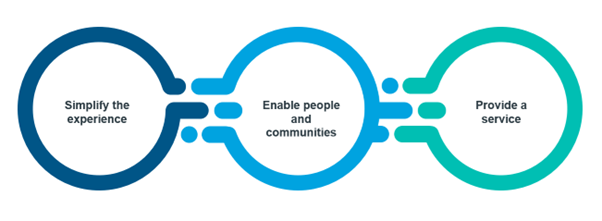Fueling transformation to increase value and improve patient outcomes
The use of the NHS App grew significantly during the pandemic, providing access to services online as well as face to face. The care system provided fantastic support under extreme pressures. Primary Care has been at the forefront of creating, providing, and developing online services, such as the NHS App for online support for people, some of whom are patients. However, there can often be too many online services for people who seek advice, support and help, which at times can be essential, but at others confusing. So how does the care system provide a digital front door on services, which unlocks the benefits and minimises the drawbacks?
Care is complicated – we need apps that can cater to all
It is easy to see why apps have proliferated. There are some common features that many apps have in common, like record sharing, diary and appointment management, medicines management, and integration to devices that enable remote monitoring. Online apps solve common problems such as screening, early warning, self-diagnosis, chronic disease management and access to physical care. The differences are that they solve specific clinical and operational problems for different groups of people who have various circumstances and conditions. The challenge is that many people have multiple conditions which require several complex interactions with care services. These cannot be managed via a number of complex and overlapping apps. Life needs to be simpler.
Equitable access to online services is essential
 Many people are in a situation where their circumstances involve complex needs including clinical needs. In our drive to enable equitable access to online services, tailored to individuals, we are paradoxically at risk of creating a confusing landscape of apps. Many apps need to be connected to services, to support everyone in the right way. For example, it is not useful having a great access management app if there is no service to access, due to a lack of bookable appointments. In retail for instance, we are supported along multiple complex journeys that enable us to buy goods or consume services, switching between online and physical services. However, in health and care we still have a long way to go.
Many people are in a situation where their circumstances involve complex needs including clinical needs. In our drive to enable equitable access to online services, tailored to individuals, we are paradoxically at risk of creating a confusing landscape of apps. Many apps need to be connected to services, to support everyone in the right way. For example, it is not useful having a great access management app if there is no service to access, due to a lack of bookable appointments. In retail for instance, we are supported along multiple complex journeys that enable us to buy goods or consume services, switching between online and physical services. However, in health and care we still have a long way to go.
People are the hidden care workforce
The opportunity in providing digital first services is huge. Our current care model is unsustainable as its focus is to manage the backlog of care of those trying to access physical services. We know the strategy of promoting population health, disease prevention and well-being being promulgated by Policymakers is crucial to the longer-term viability of the NHS. Yet at the coalface the daily operational pressure, exacerbated by funding challenges, is debilitating. The answer is to tap into the country’s hidden workforce – our people and patients. We want to live longer, healthier lives with minimal contact with care services. So, what part can apps play?
We need a digital front door on services
 There is a need to focus on creating a digital front door on services. A digital front door enables people to access services, online and in-person, in a way that intuitively helps them to navigate our care system. Intuitively means that the services have been designed to work together by service providers, to provide a simpler experience that minimises the confusion and waste in our quest to create value for patients. If patients value services, they will use them. If services are efficient and don’t waste staff resources, staff will welcome them. It takes some thought, but it is worth it.
There is a need to focus on creating a digital front door on services. A digital front door enables people to access services, online and in-person, in a way that intuitively helps them to navigate our care system. Intuitively means that the services have been designed to work together by service providers, to provide a simpler experience that minimises the confusion and waste in our quest to create value for patients. If patients value services, they will use them. If services are efficient and don’t waste staff resources, staff will welcome them. It takes some thought, but it is worth it.
Patients want to do more for themselves
We often hear that there aren’t enough GPs offering enough appointments and so there is the early Monday morning telephone rush to get in a queue. But do we need to be in that queue? We hear about patients keeping diaries, collecting data about themselves via devices and wanting to share data, so can we create a physical service that supports this, with more effective triage? Only then can we provide patients with direct access to services, potentially routed by digital triage rather than a physical GP, which might be able to free up GP time. If there was greater integration of Personal Data Stores into the electronic patient and shared care records that we currently use, the care system could have better data to make better decisions to ultimately benefit patient lives. And it might cut the need for that queue.
Simplify services and enable people and communities
There are three principles which would govern what a digital front door should do.

- Start with putting the needs of the people first and work back into the design of services. This way, we can understand what will work for people in their various roles, whether that be staff or users of services, rather than trying to engineer digital solutions that fit current service models (which were designed in an analogue world).
- Social Care has made great strides in building strength in people and communities, recognising that it cannot assume the responsibility for managing some aspects of people’s lives.Helping people to help themselves is as important as helping those who cannot.
- The focus on apps has been at the expense of designing services that are digitally enabled. Not in all cases, of course, but in enough. This is especially true where entrepreneurs have created innovative apps - but haven’t created the service offer needed to enable the app to land effectively with staff and patients.
Creating the service offer
Creating the service offer presents a complicated set of change management challenges. Operating models, job descriptions, culture, and processes all need to change. This change needs to take place in a political, regulatory, ethical, financial and performance framework where governance needs to span people, organisations and places that may need to work together in new ways. At the same time, maintaining continuity of service, with rising demand, fewer resources, and funding. There are ways of solving this set of challenges and our team have experience of providing support. If you are curious to know more, please contact paul.henderson@iqvia.com for more details.








